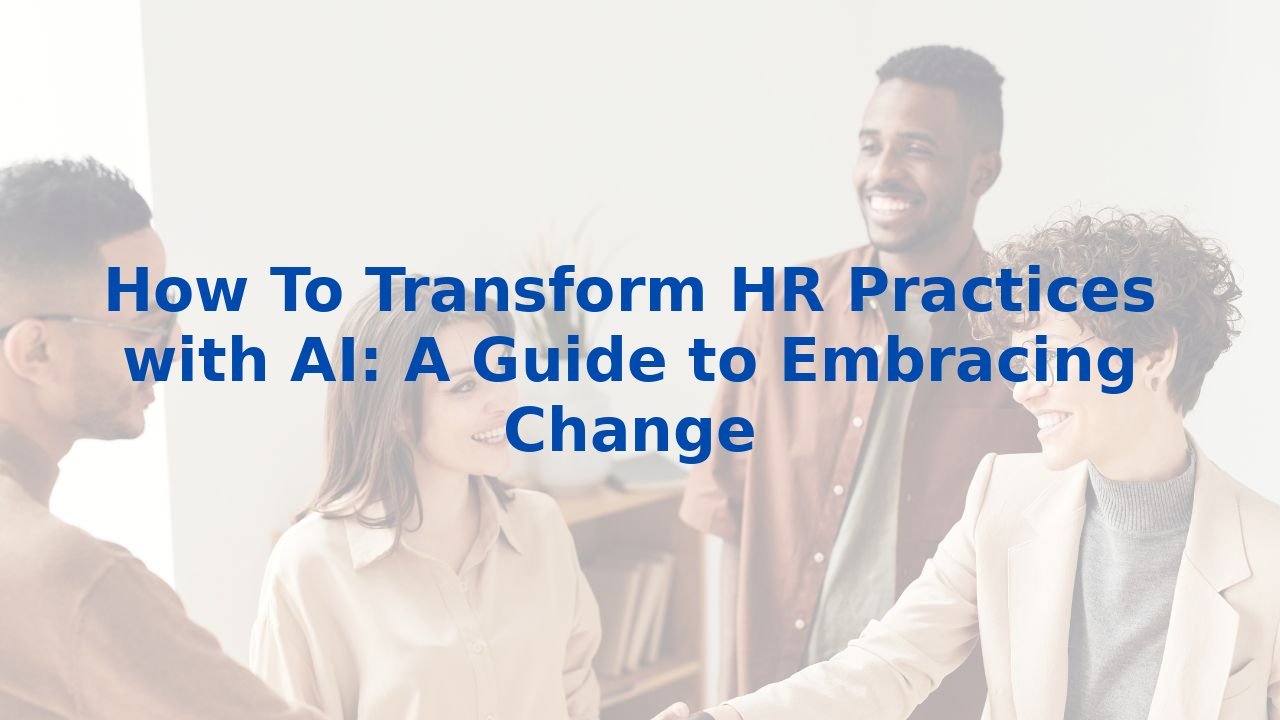How To Transform HR Practices with AI: A Guide to Embracing Change
Embracing Change: How AI Enhances HR Processes and Efficiency
In an era where speed and adaptability are paramount, organizations must shift their perspective on Human Resources (HR) from a traditional, reactive department to a proactive, innovative force. The age of digital transformation is here, and at its forefront lies Artificial Intelligence (AI) — an invaluable ally that, when strategically implemented, can completely redefine HR practices and enhance organizational efficiency.
The Need for HR Innovation
As the gatekeepers of the workforce, HR departments are crucial for driving organizational change. However, many still rely on outdated methods that can hinder progress. By incorporating AI into HR processes, organizations can break free from inefficiencies and unlock their true potential. Embracing such technological advancements not only prepares companies for the future but also empowers them to create an agile work culture that thrives amidst constant change.
How AI Enhances HR Processes
1. Automated Recruitment and Hiring
Recruitment can be a cumbersome process, but AI streamlines it by analyzing a plethora of applications. Algorithms can sift through data to identify ideal candidates and even simulate a candidate's first day to evaluate cultural fit. This not only reduces the hiring timeframe but also increases the likelihood of selecting the right talent.
2. Predictive Analytics for Talent Management
AI’s predictive capabilities help HR anticipate employee turnover and pinpoint skill gaps. By acting proactively—rather than reactively—HR departments can develop retentions strategies tailored toward keeping top talent engaged and nurturing future leaders within the organization.
3. Employee Onboarding and Training
The transition to becoming a part of an organization is pivotal. AI helps here too, through chatbots that guide new hires through company policies. Customizing training programs according to individual needs becomes feasible with AI, ensuring that learning experiences are specific, measurable, and effective.
4. Compliance and Risk Management
Staying compliant with regulations is a daunting task. AI’s analytical prowess aids HR in managing vast datasets related to employee documents and benefits, significantly reducing compliance risks and ensuring adherence to the law.
5. Employee Engagement and Feedback
Understanding employee sentiment is vital for cultivating a positive workplace culture. AI can distill feedback and sentiment data to identify areas for improvement, paving the way for continuous enhancements in employee satisfaction and engagement.
Benefits of AI for Improving Efficiency
1. Increased Efficiency
AI’s automation capabilities take the reigns on repetitive tasks, allowing HR professionals to invest their time in strategic initiatives. This transition elevates productivity, minimizes cost overheads, and encourages a forward-thinking environment.
2. Data-Driven Insights
AI doesn’t just crunch numbers—it transforms them into actionable insights. With deeper data understanding, HR can predict trends, refine strategies, and make informed decisions, ultimately driving the organization’s success.
3. Personalized Experiences
You can’t be one-size-fits-all in today’s diverse workforce. AI enables HR to craft personalized employee experiences through tailored recommendations in training and career development, directly influencing employee engagement.
The Importance of Training Employees for AI
While harnessing AI is integral, the human element mustn’t be overlooked. Training employees to effectively utilize AI tools is paramount for maximizing these benefits.
1. Understanding AI Capabilities
For AI to be effective, your team must understand its functionalities. Training provides the foundational knowledge needed to leverage AI intelligently and responsibly in day-to-day operations.
2. Operational Efficiency
Proper training reduces the learning curve, ensuring employees can navigate AI tools competently right from the get-go. This smoothes integration, minimizes errors, and aids rapid adoption.
3. Enhanced Decision-Making
Equipping employees with AI insights empowers them to make informed decisions that can significantly shape the workforce landscape. Leveraging analytical data fosters intelligent strategies in talent management.
4. Adaptability and Innovation
When employees are trained to interact with AI, they become more adaptable and ready to innovate. This continuous improvement mindset does not only enrich individual capabilities but elevates the entire organization.
Conclusion
Embracing AI in HR is more than just a technological upgrade; it’s about transformation from the inside out. By streamlining processes, offering actionable insights, and personalizing experiences, AI can elevate HR's efficiency and effectiveness dramatically. Yet, as we navigate this wave of innovation, training remains crucial. Employees equipped with AI skills are better prepared to embrace change, contributing to a culture of improvement and competitiveness that will distinguish forward-thinking organizations in the modern workplace.



